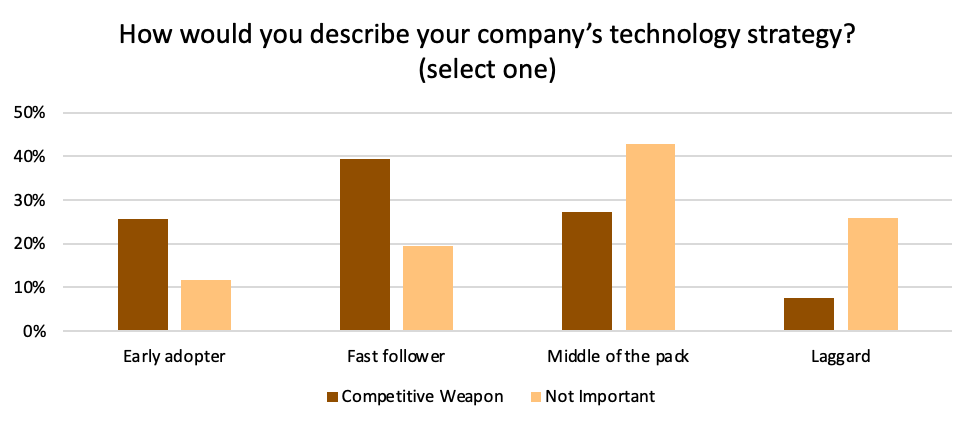
Why is it that some companies excel at transportation management and others don’t? Is it the choice of transportation-management strategies, practices or even technologies? Or is transportation-management value a self-fulfilling prophecy?
Descartes recently conducted its Sixth Annual Global Transportation Management Benchmark Survey on transportation management strategies, tactics and technology, examining how business leadership’s perception of transportation’s importance impacts financial performance and growth. The results over time are amazingly consistent, even through the pandemic.
Results of the survey were examined from two perspectives: leadership’s perception of the value of transportation management, and company financial performance. For both questions, results at high and low ends of the answer spectrum were analyzed to identify any correlation between the two and other key questions in the survey.
For the strategic importance of transportation, the survey identified respondents whose leadership considered transportation management a “Competitive Weapon” or “Not Important.” Equally, for financial performance, the survey identified those companies who were “Top Performers” or “Poorer Performers.”
Comparing the results of leadership’s view of the importance of transportation management with the company’s financial performance (Figure 1) highlighted a compelling link between the difference in thinking and financial performance. Respondents who said they had industry leading financial performance (Top Performers) were almost two times more likely to have business leadership who believed that transportation management was a competitive weapon. Simply put, companies have a much greater chance of better financial performance when the executive team sees transportation management as critical to success.
Figure 1: Strategic Importance of Transportation Management by Company Financial Performance

The same correlation applies to company growth. While it might not be surprising that the findings showed Top Performers (44%) are almost three times more likely to grow greater than 15% than Poorer Performers (21%), it is revealing to learn that Competitive Weapon respondents are almost two times more likely to grow greater than 15% annually than those who believe transportation management isn’t important (Figure 2). Transportation management is an enabler of high growth companies that not only want to get more goods to market, but also do it in a way that enhances the customer experience, competitive position and brand.
Figure 2: Growth Versus Strategic Importance of Transportation Management

Getting leadership to buy into the potential value of transportation management requires putting a spotlight on its ability to contribute to the success of the business by using metrics and practices that get more attention from executives.
Competitive Weapon respondents think more broadly about the impact of transportation management on the overall business. Leadership that believes transportation management is a competitive weapon also does a much better job at capturing its value. Too many organizations are only using traditional logistics measurements, such as delivery costs and on time in full (OTIF), as key performance indicators; however, transportation-management value goes well beyond that. Competitive Weapon respondents do a better job of measuring transportation value, using metrics that make the most difference to the C-suite: revenue and competitive differentiation (Figure 3).
Equally important is the education that the rest of the company gets once everyone begins to understand how transportation management can help the organization be more successful. There’s a significant shift in thinking about how to leverage transportation more strategically once the organization understands that it’s about more than simply “getting stuff moved.”
Figure 3: Measuring Transportation Value

Another important aspect of realizing (and showing) more value from transportation management is the degree to which transportation-related information is shared. Transportation information is not only valuable to the internal supply chain, but also to sales, customer service, customers, trading partners and carriers. This is one of the reasons why real-time transportation visibility is top of mind for many organizations, as customers want to know the status of their shipments and incorporate this data into their planning processes. There’s an entire transportation lifecycle of shipment information that can be shared to add value to the enterprise and all supply chain participants. Again, Competitive Weapon respondents do a significantly better job at sharing information across the organization and with external supply chain stakeholders (Figure 4).
Figure 4: Creating Value Through Transportation Information Sharing

Given the fluidity of today’s supply chains, the ability to create unique transportation management strategies that take advantage of current situations is critical to maximizing its impact on the business. For leadership that believes that transportation management is a competitive weapon, the ingenuity of transportation management strategies is essential to help them stay ahead of the competition. Three-quarters of Competitive Weapon respondents indicated that they create or adopt leading-edge transportation strategies (Figure 5). This response rate is approximately three times greater than those respondents who said leadership didn’t think transportation management was important.
Figure 5: Company Strategy for Transportation Management

Technology plays a critical role in transportation management strategies and the two are highly intertwined, as technology-based capabilities can define the approach to strategies. Leading-edge strategies need leading-edge technologies to support them. There’s an element of risk here, but there are also numerous cases where the combination of innovative transportation-management strategies and technologies delivered results that made a material difference to the companies that deployed them. Three-quarters of Competitive Weapon respondents indicated they were either an early adopter or fast follower with technology strategies. More significantly, Competitive Weapon respondents were greater than two times more likely to be an early adopter when implementing technology strategies.
Figure 6: Technology Strategy for Transportation Management

Transportation management success is a self-fulfilling prophecy. When leadership believes it to be a competitive weapon, the company performs better financially and grows faster than others with management who consider it unimportant. Why? Because the belief that transportation management is a competitive weapon turns into actions that make a difference. Top performers measure its full impact on the business. They do a better job at leveraging transportation information for the benefit of the entire supply chain. Their transportation management strategies and technologies are focused on exploiting new thinking and capabilities that make a difference to enterprise performance.
For those that don’t think transportation management is important to success, it’s almost akin to entering a fight with one arm tied behind their back — and their financial performance shows it.
Chris Jones is executive vice president of industry and services at Descartes.







